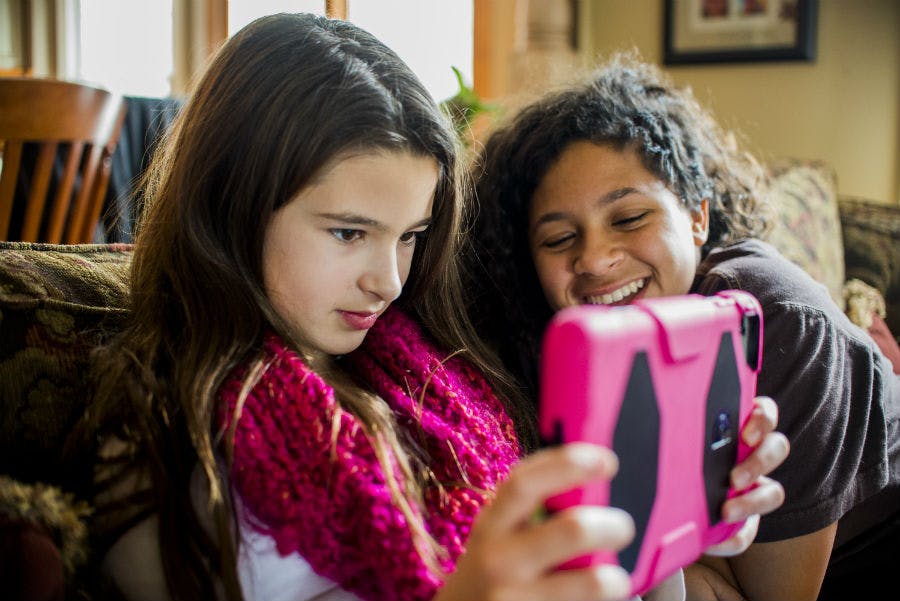Screens: They’re everywhere. With the enormous popularity of smartphones, they’re even more ubiquitous, with people of all ages essentially attached to their devices 24/7.
While technology has made remarkable steps forward, and brings with it countless benefits, many people naturally begin to wonder about the possible negative effects. After all, something that is so pervasive in our daily lives is bound to make some sort of impact on us.
As adults, we generally know how to do what is best for us, and if we’re using our phones too frequently (or becoming somewhat ‘addicted’ to our devices) we make an effort to cut back.
But what about for our children, who have little to no inclination to impose limits on their own screen use. Kids love their devices, and studies show they spend about 2 hours 19 minutes per day (ages 0-8) and 4 hours 36 minutes (ages 8-12) interacting with screens. Other research states that the average is closer to 7 hours of screen time per day and up to 20 hours per week on Fortnite alone.
Could this have a potentially harmful impact? What could excessive screen time be doing to your child’s mental health?
Let’s investigate together.
How Children Use Screens
The average child may interact with television screens daily, but it is likely that smartphones and tablets are an even more constant form of screen media. These portable devices offer the chance for kids to watch shows and movies, plus play games, chat with friends, go to their favourite websites, or explore social media. Without a doubt, mobile devices provide a great deal of fun for kids 12 and under.
But at 12 and under, children are right in the middle of the development process, especially with regards to their mental growth. The ways in which they use screens---and the frequency with which they do so---matters.
It seems that use of screens for school-related activities and assignments doesn’t display the same negative outcome as much as recreational screen time. In the linked study, there was no correlation between the non-recreational screen time and anxiety/depression. This is good news, as technology plays an important role in learning in many schools, particularly in the classrooms of older children.

Research suggests kids spend as much as 7 hours per day using screens
But our kids’ non-stop access to devices, TVs, and video games has generated some concern in parents across the globe. What is this doing to our children? Articles with alarmist titles showcase the varying angles of our anxiety: “Too Much Screen Time May Be Damaging Children’s Eyesight,” “Are Our Smartphones Afflicting Us All with Symptoms of ADHD?” and “Too Much TV at Age 2 Makes For Less Healthy Adolescents.”
Yikes. It’s no wonder we parents fear the possible outcomes of too much screen time. But where’s the evidence for these impacts? Looking at mental health and screen time, let’s see what the experts have to say.
A Link to Anxiety/Depression?
While there may be no definitive answer, a range of research provides evidence of excessive screen time linking to negative mental health outcomes.
Interestingly, studies about “Internet/video game addiction” reveal that this immoderate exposure to screens actually changes the physical brain. Incidents of atrophy, or shrinkage, were observed in the brain in areas that affect important executive functioning abilities, like planning, prioritising, or controlling impulses. White matter within the brain may also be affected, material which is involved in distributing signals and processing information. This Psychology Today article perhaps says it best: “[With] excessive screen-time...much of the damage occurs in the brain’s frontal lobe, which undergoes massive changes from puberty until the mid-twenties.” The development of the frontal lobe is integral to “determining success” in virtually every area of life.
Many of the links between mental health and screens seem to be emotional and psychological rather than physical. These are not necessarily correlated to the simple act of interacting with screens, but are based more heavily on what the individual is doing when using the screen/device.
For example, some studies show a relationship between the use of social networking sites and symptoms of depression or anxiety in children and adolescents. This has many contributing factors. Social comparison seems to be a significant one; when kids see the lives or photos of peers or others on social media, it can lead to a state of comparison, which can yield dissatisfaction with their own life. This, of course, is likely to vary from individual to individual, and it may be less of a factor in younger children, who may not have yet developed a deeper understanding of ‘social status’, etc.
It’s not just children who suffer from increased exposure to social media. According to the author’s of one study, “The more people used Facebook at one time point, the worse they felt the next time.” Results demonstrated that their levels of “life satisfaction” decreased as they continued to access Facebook increasingly over a two week period. If there’s any conclusion we can draw from this, it’s that there is a benefit to limiting our exposure to social media---at any age.
It appears that no matter what the activity, high amounts of leisure screen time are linked to increased incidences of anxiety, depression, and other mental health issues.
For some young people, the over-exposure to devices influences mental health because it can lead to deficiencies in the child’s social skills. This is especially true for those kids predisposed to a social anxiety disorder. They may prefer to use digital methods (non-face-to-face interaction) when connecting with others. Yet this can reinforce a sort of “coping” behaviour that is ultimately not conducive to the child’s personal growth. And in some scenarios, it can contribute to a child’s increased isolation.
Speaking of coping, social media can often be used as a coping mechanism for many young people. This can impact their emotional intelligence, and their ability to deal with their own negative emotions. Most vitally, the substitution of social media as a method of avoidance or distraction can prevent kids from properly developing emotional regulation, or the tools/skills necessary to handle “big emotions”. Emotional regulation, or self-regulation, is a crucial element in mental health. Issues with emotional regulation are often associated with mental health disorders.
Signs of a Problem and What Parents Can Do
As a parent, you’re probably wondering do I need to worry?
Interaction with devices and other technology may be unavoidable in this day and age, but as a parent, you can set guidelines to keep your kids’ screen time to an amount of time you deem reasonable. Most of all, you can keep an eye on your children to observe if they show signs of stress, fatigue, or mental health concerns related to screen interaction.
For younger children, note if they seem to be “revved up” more than is typical. They might also seem to be both exhausted and energetic concurrently, which happens to many of us when we’ve been staring for too long at screens. Kids who throw frequent fits---especially when having devices taken away from them---may need to have their screen time checked.

Are you noticing changes in your kid’s behaviour?
Also, notice how your child behaves apart from technology. Do they seem to be less social? Is their attention increasingly prone to wandering/distraction?
For older kids, you might take care to watch their mental state. If they are more withdrawn than usual or take less interest in previously enjoyed activities, you may want to investigate further. Also, keep an eye on their school performance. A sudden decline in the quality of their work or their grades could potentially be screen-related.
When in doubt, get outside. No matter how much time your child (or you yourself) spend with screens, there’s always a benefit to spending time in nature. Leave the devices at home and go for a walk or hike as a family. You can also host regular “digital detoxes” or even just an evening when smartphones, tablets, and the TV are not allowed. These moments will allow you all to reconnect as a family, and perhaps most of all, they instil in your child an appreciation of face-to-face interactions and device-free living.
When deciding upon screen time boundaries, here are some general rules or boundaries you may wish to enforce, as well as some habits you can help create in your household:
- No screen time after dinner
- Encourage children to take breaks regularly when using screens
- Call your child’s attention to their response to their screens---for instance, talk to them about how they feel in body and mind when they’ve been on their device for a long time. They might discover for themselves that taking a break is a good thing.
- Model good device behaviours for your kids (don’t bring your phone to the dinner table)
- Have fewer device charging cables lying around the house
- Set specific times of day in which your kids can use their devices
- Use apps that let you control or monitor your children’s usage
- Allow children to choose their screen time period, helping them learn to prioritise
- Have your kids earn their screen time by doing chores or completing other non-technological tasks
You can always check out this NPR piece on “What the Screen Time Experts Do With Their Own Kids” for additional and more specific ideas.
What do you think about kids and screen time?
Disclaimer: The Southern Phone blog does not provide medical advice, diagnosis, or treatment. The content on this website and blog is not intended to be used for medical diagnosis or treatment. The information provided within this article is intended for general consumer information and entertainment only. The information provided is not intended to be a substitute for professional medical advice.